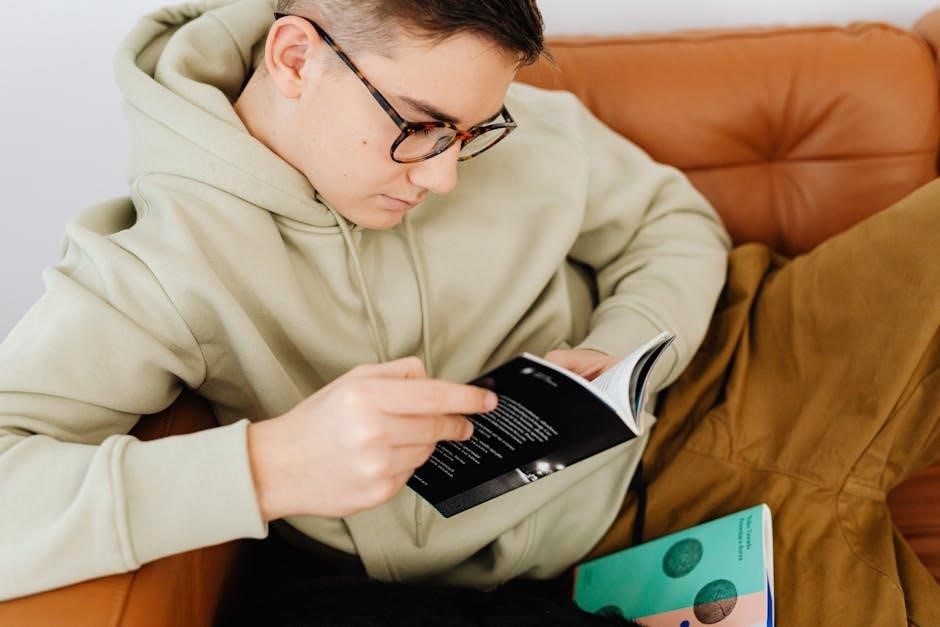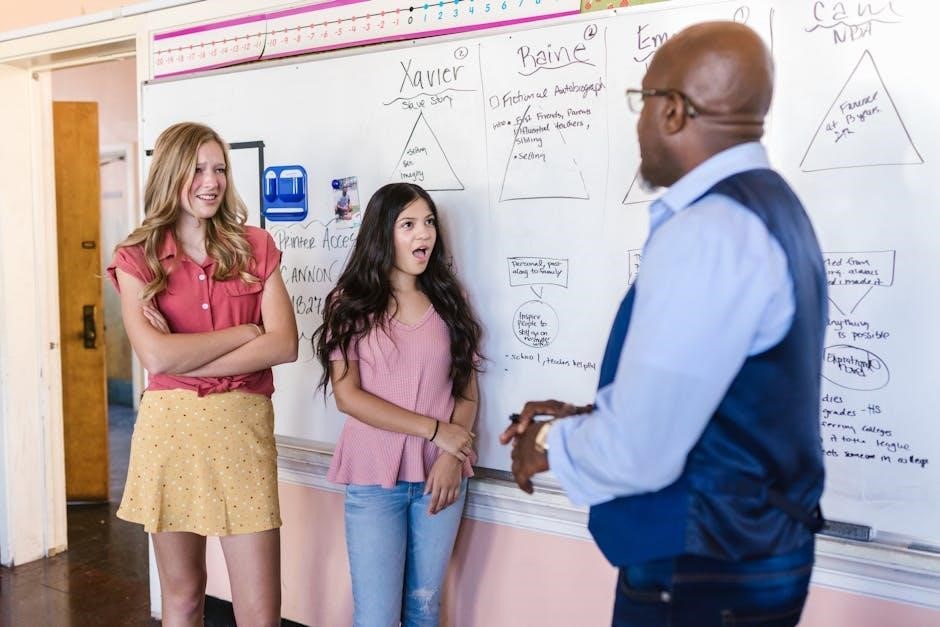Sean Covey’s The 7 Habits of Highly Effective Teens offers a roadmap for adolescents to navigate life’s challenges. This guide adapts Stephen Covey’s timeless principles for young audiences, focusing on self-awareness, goal-setting, and proactive behavior. It empowers teens to build self-esteem, improve relationships, and make informed decisions, providing practical tools for personal growth and effectiveness in a rapidly changing world.
Overview of the Book
Written by Sean Covey, The 7 Habits of Highly Effective Teens is a guide tailored specifically for adolescents, adapting the timeless principles from Stephen Covey’s The 7 Habits of Highly Effective People. The book addresses the unique challenges of teenage life, offering practical advice on building self-esteem, fostering meaningful relationships, and making informed decisions. Covey emphasizes habits such as being proactive, setting clear goals, and understanding others, which are essential for personal growth and effectiveness. The book is structured to resonate with teens, using relatable examples and a conversational tone. It has been updated to reflect modern issues, such as navigating the digital age and balancing academic pressures. By focusing on self-awareness and continuous improvement, The 7 Habits of Highly Effective Teens provides a roadmap for young people to overcome obstacles and develop into capable, confident individuals. Its accessible format and actionable strategies make it a valuable resource for teens seeking to enhance their lives and futures.
Importance of the Book for Teenagers

Sean Covey’s The 7 Habits of Highly Effective Teens is a transformative guide tailored to address the unique challenges of adolescence. Its relevance lies in its ability to empower teenagers with practical tools to navigate self-esteem issues, peer pressure, and life-changing decisions. The book emphasizes habits such as proactive behavior, goal-setting, and understanding others, which are crucial for building resilience and confidence. By focusing on personal growth and self-awareness, it helps teens develop a mindset that fosters success in both academics and personal relationships. The updated content also addresses modern challenges like social media and digital distractions, making it highly relevant for today’s youth. Ultimately, the book equips teenagers with the skills to overcome obstacles, think critically, and make informed choices, setting them on a path to becoming capable and confident individuals. Its accessible tone and actionable advice make it an indispensable resource for teens striving to thrive in a complex world.

About Sean Covey
Sean Covey, son of Stephen R. Covey, is an author and speaker known for adapting his father’s principles into The 7 Habits of Highly Effective Teens, empowering teens with tools for personal growth.
Background and Biography of Sean Covey
Sean Covey, born in 1964, is the son of the renowned Stephen R. Covey, author of The 7 Habits of Highly Effective People. Sean has carved his own path in the field of personal development, adapting his father’s principles for younger audiences. He holds a degree in English and an MBA from Brigham Young University, equipping him with a strong foundation in both literature and business. Sean’s career has focused on empowering individuals, particularly teenagers, through practical and relatable guidance. His book, The 7 Habits of Highly Effective Teens, has become a cornerstone for adolescent development, addressing challenges like self-esteem, relationships, and decision-making. As a motivational speaker and author, Sean continues to inspire teens and educators worldwide, emphasizing the importance of proactive living and personal responsibility. His work reflects a deep understanding of youth struggles and a commitment to fostering resilience and effectiveness in the next generation.
Sean Covey’s Approach to Teen Development

Sean Covey’s approach to teen development is centered on empowering young people with practical, actionable principles. He emphasizes self-awareness, personal responsibility, and proactive decision-making, encouraging teens to take charge of their lives. His methods are rooted in his father’s renowned 7 Habits but tailored to address the unique challenges of adolescence. Covey’s approach focuses on helping teens build strong relationships, improve self-esteem, and navigate life’s complexities. He advocates for a holistic development model that balances personal growth with interpersonal effectiveness. By providing relatable examples and real-life applications, Covey makes his principles accessible and engaging. His work emphasizes the importance of empathy, communication, and continuous improvement, equipping teens with tools to thrive in an ever-changing world. This approach has resonated with millions, making him a trusted voice in youth development and education.

The Seven Habits Explained
The seven habits are timeless principles guiding teens toward effectiveness. They include being proactive, beginning with the end in mind, prioritizing, thinking win-win, seeking understanding, synergizing, and self-renewal. These habits foster personal growth and success.
Habit 1: Be Proactive
Habit 1, “Be Proactive,” encourages teens to take responsibility for their choices and actions. It emphasizes self-awareness and recognizing the power to choose responses to life’s challenges. Proactive individuals focus on what they can control, rather than blaming external circumstances. This habit helps teens develop a mindset of accountability, empowering them to make wise decisions and face obstacles with confidence. By being proactive, teens can take charge of their lives, fostering personal growth and effectiveness in all areas. This foundational habit sets the stage for mastering the other six, as it promotes self-discipline and initiative. Sean Covey highlights that proactive behavior is a key trait of highly effective teens, enabling them to overcome fear and take ownership of their success. Through this habit, teens learn to embrace their agency and shape their own futures.
Habit 2: Begin with the End in Mind
Habit 2, “Begin with the End in Mind,” teaches teens to set long-term goals and create a personal mission statement. It encourages them to think deeply about their values and what they want to achieve in life. By focusing on the end result, teens can prioritize tasks and make decisions that align with their goals. This habit helps them avoid getting distracted by less important things and instead stay focused on what truly matters. Sean Covey emphasizes the importance of having a clear vision, as it provides direction and purpose. Teens are encouraged to reflect on their core values and define how they want to be remembered. This habit fosters self-discipline and helps teens develop a sense of responsibility for their future. By starting with the end in mind, they can create a roadmap for success and live a life that reflects their true priorities and aspirations.
Habit 3: Put First Things First
Habit 3, “Put First Things First,” focuses on time management and prioritization. Sean Covey introduces the Time Management Matrix, which categorizes tasks into four quadrants: urgent and important, important but not urgent, urgent but not important, and trivial. Teens are encouraged to focus on what is truly important, delegate or eliminate less critical tasks, and avoid distractions. By prioritizing tasks effectively, they can manage their time more efficiently, reduce stress, and achieve their goals. This habit emphasizes the importance of self-discipline and self-management, helping teens avoid procrastination and stay productive. By learning to put first things first, teens can create a balanced and organized lifestyle that aligns with their personal mission and values. This habit is essential for academic success, personal growth, and building strong relationships, as it teaches teens to make intentional decisions about how they spend their time.
Habit 4: Think Win-Win
Habit 4, “Think Win-Win,” encourages teens to adopt a mindset where everyone’s success is valued. Sean Covey emphasizes that true success comes from mutually beneficial relationships, where both parties feel satisfied and respected. This habit teaches teens to seek solutions that satisfy all involved, fostering collaboration and trust. By focusing on win-win outcomes, teens can build stronger friendships, improve family relationships, and excel academically. The internet highlights how this habit helps teens avoid unhealthy competition and instead embrace empathy and fairness. Covey provides practical examples, such as active listening and open communication, to achieve win-win results. This habit is crucial for developing emotional intelligence and learning to see situations from others’ perspectives. By thinking win-win, teens can create a positive environment where everyone thrives, leading to lasting personal and interpersonal growth. This approach not only enhances their relationships but also equips them with skills to handle conflicts constructively and build a supportive community.
Habit 5: Seek First to Understand, Then to Be Understood
Habit 5, “Seek First to Understand, Then to Be Understood,” focuses on the importance of empathy and effective communication. Sean Covey emphasizes that understanding others is a cornerstone of strong relationships. Teens are encouraged to listen actively and try to see things from another person’s perspective before expressing their own views. This habit helps teens avoid misunderstandings and conflicts by fostering mutual respect and open dialogue. Covey provides practical advice, such as asking questions to clarify feelings and avoiding interrupting others. By prioritizing understanding, teens can build deeper connections and resolve disagreements more effectively. This habit also promotes emotional intelligence, teaching teens to value others’ opinions and feelings. In a world where communication is often one-sided, Habit 5 encourages teens to become empathetic listeners, creating a foundation for meaningful relationships and personal growth.
Habit 6: Synergize

Habit 6, “Synergize,” focuses on the power of collaboration and teamwork. Sean Covey explains that synergy is about working together to achieve something greater than what could be accomplished individually. This habit encourages teens to value diversity, combine strengths, and overcome weaknesses by working with others. Covey emphasizes that synergy is not just compromise but a creative process where everyone’s ideas and perspectives are respected. By synergizing, teens can solve problems more effectively, achieve their goals, and build stronger relationships. This habit teaches the importance of open communication, active listening, and valuing different viewpoints. Synergy helps teens move beyond a “me versus you” mindset to a “we” mentality, fostering mutual success and understanding. Through synergy, teens learn that collaboration can lead to innovative solutions and meaningful outcomes, making it a powerful tool for personal and collective growth.
Habit 7: Sharpen the Saw
Habit 7, “Sharpen the Saw,” focuses on self-care and personal renewal. Sean Covey emphasizes the importance of regularly renewing and strengthening the four key dimensions of a teen’s life: physical, social/emotional, mental, and spiritual. This habit encourages teens to take time to recharge, ensuring they maintain the energy and resilience needed to tackle life’s challenges effectively. By prioritizing activities that nourish these areas—such as exercise, meaningful relationships, learning, and reflection—teens can achieve a balanced and fulfilling life. Covey stresses that neglecting self-care can lead to burnout and decreased effectiveness, while proactive renewal fosters growth and sustainability. Sharpening the saw is not a luxury but a necessity for long-term success and happiness, helping teens stay focused, motivated, and prepared to apply the other six habits effectively in their daily lives.

Practical Application of the Habits
The 7 Habits empower teens to navigate real-world challenges effectively. By applying these principles, they can improve academic performance, enhance relationships, and foster personal growth, ensuring a balanced and successful approach to life’s demands.
Applying the Habits in School
The 7 Habits provide a framework for academic success, helping teens excel in school. By being proactive, students take charge of their learning, prioritizing tasks and managing time effectively. Beginning with the end in mind, they set clear goals, aligning daily efforts with long-term aspirations. Putting first things first ensures they focus on what truly matters, balancing academics with extracurricular activities. Thinking win-win fosters collaboration with peers, enhancing group projects and study sessions. Seeking to understand before being understood improves communication with teachers and classmates, resolving conflicts constructively. Synergizing leads to innovative solutions, while sharpening the saw promotes self-care, maintaining mental and physical well-being. These habits create a holistic approach to education, empowering teens to thrive academically and personally.
Using the Habits to Improve Relationships
The 7 Habits are powerful tools for fostering healthy and meaningful relationships. By being proactive, teens can address conflicts before they escalate, taking responsibility for their actions and emotions. Beginning with the end in mind helps set clear expectations and shared goals, strengthening trust and connection. Putting first things first ensures quality time is allocated to loved ones, nurturing relationships. Thinking win-win encourages mutual respect and compromise, while seeking to understand before being understood promotes empathy and effective communication. Synergizing fosters collaboration, turning differences into strengths. Sharpening the saw emphasizes self-care, ensuring emotional stability to support others. These habits collectively create a foundation for understanding, respect, and lasting bonds, empowering teens to build and maintain positive relationships in all areas of life.

Enhancing Personal Growth Through the Habits
The 7 Habits provide a powerful framework for teens to achieve personal growth and self-improvement. By being proactive, teens take charge of their choices and attitudes, fostering self-awareness and accountability. Beginning with the end in mind helps them define personal values and goals, guiding their decisions and actions. Putting first things first ensures they prioritize activities that align with their aspirations, building discipline and focus. Thinking win-win nurtures a mindset of mutual respect and confidence, while seeking to understand others before being understood enhances emotional intelligence and empathy. Synergizing encourages collaboration and openness to new ideas, broadening perspectives. Finally, sharpening the saw emphasizes self-care and continuous improvement, promoting balance and renewal. Together, these habits empower teens to cultivate resilience, self-esteem, and a growth mindset, equipping them to overcome challenges and achieve their full potential in life.

Case Studies and Real-Life Examples
The book shares inspiring stories of teens who applied the habits to overcome challenges, improve relationships, and achieve personal growth. These real-life examples demonstrate how the habits can transform lives, fostering resilience and success in various aspects of teenage life.
Real-Life Examples of the Habits in Action
Sean Covey’s book is enriched with real-life stories of teenagers who successfully applied the 7 habits to overcome challenges. For instance, one teen used Habit 1, Be Proactive, to take responsibility for their academics after falling behind, while another employed Habit 2, Begin with the End in Mind, to set and achieve personal goals. A student struggling with peer pressure found success with Habit 3, Put First Things First, by prioritizing their values over temporary pressures. Habit 4, Think Win-Win, helped a teen resolve conflicts with classmates by focusing on mutual benefits. These examples illustrate how the habits empower teens to navigate real-world issues effectively, fostering resilience, confidence, and personal growth. The stories serve as powerful reminders that the habits are not just theoretical but actionable tools for transforming lives.
Testimonials from Teens Who Applied the Habits
Teenagers who have applied the 7 habits share inspiring stories of transformation. One teen mentioned, “Habit 1 helped me stop blaming others and take control of my life.” Another shared, “By using Habit 2, I set clear goals and improved my grades significantly.” Many teens highlighted how Habit 5, Seek First to Understand, Then to Be Understood, improved their relationships with family and friends. One reader wrote, “This book taught me how to communicate better and resolve conflicts peacefully.” Another testified, “Habit 7, Sharpen the Saw, reminded me to take care of my mental and physical health, which boosted my confidence.” These testimonials demonstrate how the habits empower teens to overcome challenges, build stronger relationships, and achieve their goals. The book’s practical advice resonates deeply, helping young people feel more in control of their lives and hopeful about their future.

The Impact and Legacy of the Book
Sean Covey’s The 7 Habits of Highly Effective Teens has left a lasting impact, empowering millions of young people worldwide. Its timeless principles, now updated for the digital age, continue to inspire teens to embrace self-awareness, goal-setting, and personal growth. The book’s legacy lies in its ability to adapt to modern challenges, offering practical tools for navigating adolescence and beyond. Its influence extends through workbooks, guides, and testimonials, solidifying its role as a cornerstone of teen development and success.
Reception and Reviews of the Book
Sean Covey’s The 7 Habits of Highly Effective Teens has garnered widespread acclaim for its practical and relatable advice tailored to adolescents. The book has been a New York Times bestseller, praised by teens, parents, and educators alike for its ability to address modern challenges. Many reviewers highlight its accessible language and actionable strategies, which empower young readers to build self-esteem and improve their decision-making skills. The book’s focus on personal growth, relationships, and goal-setting resonates deeply with its audience. With a 5-star rating on various platforms, it is often recommended as a must-read for teenagers navigating the complexities of growing up. Its timeless principles, now updated for the digital age, ensure its relevance to contemporary issues. The book’s success has also led to the creation of companion workbooks and guides, further solidifying its impact as a trusted resource for teen development.
The Book’s Influence on Teen Development
Sean Covey’s The 7 Habits of Highly Effective Teens has profoundly influenced teen development by equipping young people with essential life skills. Its principles, such as being proactive and fostering win-win relationships, have helped teens build resilience and confidence. The book’s emphasis on self-awareness and goal-setting has empowered adolescents to take control of their lives, making informed decisions and fostering personal growth. Many teens have credited the book with improving their academic performance, relationships, and overall mindset. Its relatable approach has made it a trusted guide for navigating the challenges of adolescence, offering tools that extend beyond teenage years into adulthood. By encouraging continuous self-improvement and ethical behavior, the book has shaped a generation of more thoughtful and effective individuals, leaving a lasting legacy in teen development.